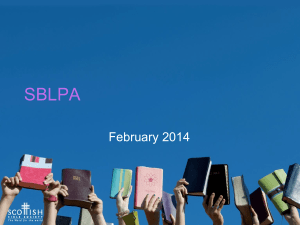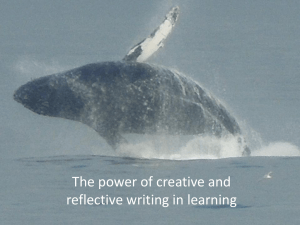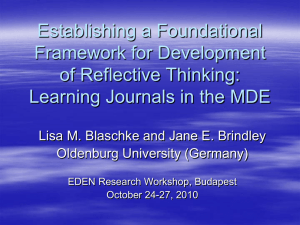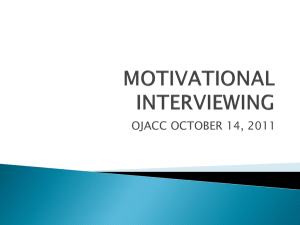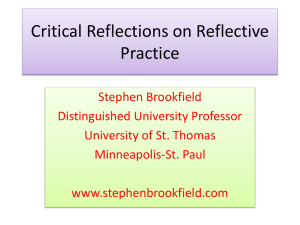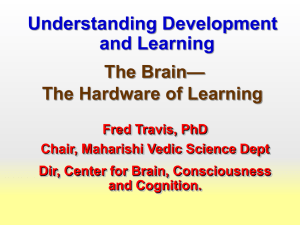The Reflective Learning System
advertisement
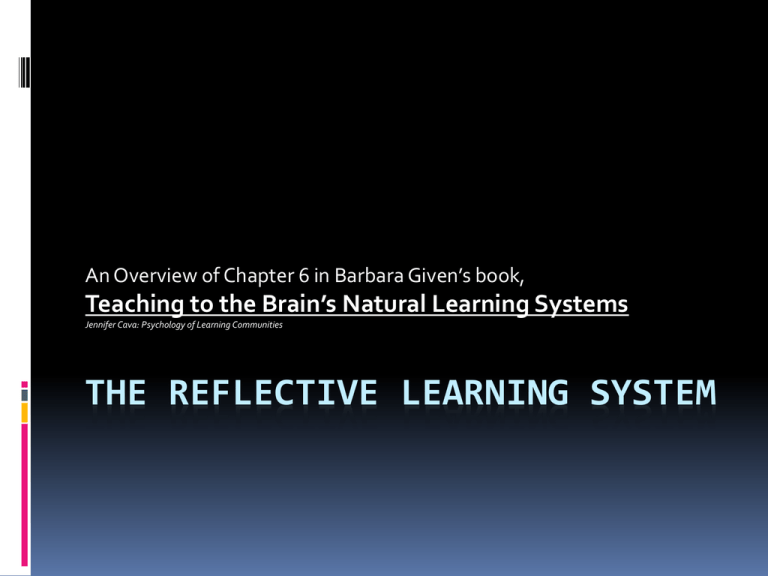
An Overview of Chapter 6 in Barbara Given’s book, Teaching to the Brain’s Natural Learning Systems Jennifer Cava: Psychology of Learning Communities THE REFLECTIVE LEARNING SYSTEM What is reflective learning? Most sophisticated learning system • Last system to develop during one’s lifetime • Last to develop in terms of evolution Deals with brain and body’s executive functions • Higher-level Thinking & Problem Solving • Ability to be in the present, while “reliving the past and contemplating the future” (Given, 2002) It is the system that distinguishes us from chimpanzees and other apes and makes us human. (Dozier, 1998; Restak, 1994) According to David Perkins, “the reflective system allows us to become all we are capable of becoming.” (1995) Personal consideration of one’s own learning Knowledge of one’s own learning style (what works, what doesn’t) Monitoring your own thinking Reflective Intelligence The Basis of Reflective Learning Conscience Extended Consciousness Core Consciousness Core Consciousness • What we see, hear, touch, smell, or taste in the present creates a feeling or temporary knowledge Extended Consciousness • Development of “autobiographical self” • Builds off of core consciousness, but involves memory Conscience • Extended consciousness inspires curiosity about the self, leading to the development of a conscience Conscience, Spirit, & Reflective Learning Conscience [Monitors feelings, thoughts, & actions] Spirit [Personality of the emotional system] The student’s moral development [Guides their work ethic, sense of fairness, and commitment] The Brain and Reflective Learning The Frontal Lobes are most critical for reflective learning because they: Inhibit our “primitive urges” Anticipate consequences for actions Develop goals Balance our emotions Our Frontal Lobes Comprise almost 40% of the human brain Are more than 200% larger than the chimpanzee brain (Dozier, 1998; Restak, 1994) “Perhaps of greatest importance, the frontal lobes tell us what not to say and do.” (Diamond, Personal Communication) Frontal Lobe Malfunctions Loss of ambition • Produces apathy Sequencing disturbances Lack of executive control • Difficulty keeping track of information • Can not anticipate consequences Disturbed future memory • Interferes with goal setting Disturbance in continuity from past into future • Failure to see self as evolving person “Because the frontal lobes continue to develop through adolescence and educators continue to have opportunities for making a difference in students into adulthood, considered difficult to teach, as well as those whose stages of development are within expectations.” (Given, 2002) What can teachers do????? We must allow time for reflective thought. We must ASK QUESTIONS!! What worked? What didn’t work? Why do you think this is so? How might your group design the next project differently do it works better? What ELSE can teachers do?? Provide broad thinking challenges (remembering, problem solving, and decision making) Collect and analyze data to figure out what needs to be modified Identify and nurture student strengths Cultivate positive attitudes Be a Talent Scout “ALTHOUGH THE REFLECTIVE LEARNING SYSTEM IS THE LAST TO DEVELOP BIOLOGICALLY, IT IS THE MOST HUMAN LEARNING SYSTEMS, ACTING AS THE BRAIN’S OF ALL CHIEF EXECUTIVE OFFICER TO INTEGRATE THE ORGAN’S OLDEST AND NEWEST PARTS INTO A COHESIVE WHOLE.” (GIVEN, 2002)

